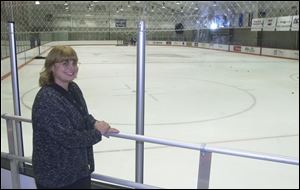
Findlay rink may be home to a cool kind of treatment
11/6/2000
'One thing I believe about the Findlay area is that there's not enough programming for persons with disabilities - unless you start it yourself,' says Jean Folkerth, director of the University of Findlay's recreation therapy program.
FINDLAY - When Kenneth Zirkle, president of the University of Findlay, mentioned to the faculty in the spring that the university's shiny new ice arena was only in use 65 per cent of the time, Jean Folkerth got an idea.
As director of UF's four-year-old recreation therapy program, Dr. Folkerth figured there must be a way to take advantage of the new facility. Recreation therapy, she explained, is focused on providing fun and purposeful activities to bring about changes in people who suffer from physical, psychiatric, or social disabilities.
“One thing I believe about the Findlay area is that there's not enough programming for persons with disabilities - unless you start it yourself,” she said.
Dr. Folkerth got on the Internet and soon became familiar with SABAH - the Skating Association for the Blind and Handicapped, Inc.
The small but strong organization has been around 23 years, but its presence has been limited to western New York where it was founded by Elizabeth O'Donnell, a former skater with the Ice Capades.
It was in 1976 that Ms. O'Donnell began teaching people who were blind to skate. She formed a nonprofit educational corporation the next year and expanded its outreach to include children and adults with all types of disabilities.
SABAH has chapters in Rochester and Glens Falls, N.Y., and at Mercyhurst College in Erie, Pa., according to Tomi Tripp, secretary for Buffalo-based SABAH.
If Dr. Folkerth has her way, one will be in Findlay by next fall.
“We plan to start with 40 people of all ages and all disabilities,” she said. “We're going to try to stay with Hancock and Wood counties for now, but we eventually hope it would become a northwest Ohio chapter.”
Ms. O'Donnell will be at the University of Findlay Nov. 28 for a 9:30 a.m. demonstration at Clauss Ice Arena, a campus meeting at 2 p.m. and a community meeting at 7 p.m., both at Alumni Memorial Union, to talk about forming a SABAH chapter.
At the demonstration, Molly Keenan, a 24-year-old Buffalo woman with cerebral palsy and a five-year skater with SABAH will take to the ice. Ms. O'Donnell also will work with several disabled persons from the Findlay area who will get on the ice for their first time.
Helen Stahl, who coordinates the Special Olympics program at Blanchard Valley Center, said she expects parents, students, and adult clients to be extremely interested in the program. Blanchard Valley, which serves the mentally retarded in Hancock County, is sending out notices about the demonstration and meeting to all families it touches.
“I'm really excited about it,” she said. “It's going to be something that will not only benefit us but Wood County, and I can see the program really growing.”
To get started, Dr. Folkerth said the local chapter will need about $100,000 for equipment, including adaptive skates, walkers, and harnesses, as well as operating money to pay a part-time instructor. The university has agreed to provide the ice time for the first year.
Dr. Folkerth said the planning committee is tapping area foundations, service clubs, and others who might be interested in supporting the chapter. While participants would be charged “a nominal fee,” she said the chapter would require constant fund-raising efforts.
In addition to money, the proposed chapter will need volunteers and a skating instructor. Dr. Folkerth herself does not skate and kiddingly remarked that no one on the planning committee does either.
She said to her, offering disabled persons the opportunity to get on the ice is just another way to let them access more of what life has to offer.
“Persons with disabilities have the same needs that you and I do. They don't always have the same opportunities,” she said.
Ms. Tripp said ice skating has proven incredibly beneficial for strengthening the legs - and the resolve - of thousands of disabled persons.
“It's good for their ego,” she said. “It's really good for their self-confidence.”
Dr. Folkerth said the SABAH chapter would be another way for the university to reach out to the community.
“I think it's so important to provide services to the community, and it provides such wonderful opportunities for our students,” she said.